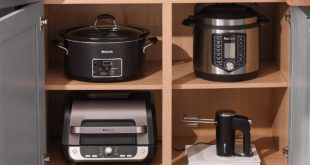While typical product replacement cycles may start to buoy the home and housewares industry next year, Joe Derochowski, Circana home industry advisor, outlined opportunities for brands to proactively drive growth and position themselves for success in the short-, mid- and long-term in a keynote session, Uncovering Growth Opportunities for the Home + Housewares Industry: 2024 & Beyond, today at The Inspired Home Show 2024.

“We really are craving innovation as an industry,” said Derochowski. “We need innovation not just in products, but in marketing, in merchandising, and along the path to purchase.”
Fewer new items have been introduced in general merchandise categories over the last few years due to the pandemic, resulting in manufacturing closures and then supply chain backlogs. But Derochowski said new item introductions are even lower for housewares, a trend that continued through 2023.
According to Circana’s Retail Tracking Service, new items accounted for 19% of units sold across all general merchandise categories in 2021. (Those industries include beauty, footwear, small appliances, technology and toys.) That number decreased to 18% in 2022 and 15.1% in 2023. But when looking at only small appliances, new items accounted for lower percentages: 14.4% of all units sold in 2021, 12.6% in 2022 and 12.2% in 2023.
Derochowski said new products in home and housewares typically yielded a percentage “in the high teens” in the years prior to the pandemic.
When it comes to new approaches in marketing, Derochowski said the only general merchandise category that increased unit sales last year (over 2022) was a category that has embraced social media – beauty. He also noted that two products in the home space that are selling well are salad spinners and portable beverageware, which have also been marketed well on social media. “I think at this point, we need to be asking ‘What can we do from a marketing standpoint to drive sales?’” said Derochowski.
There’s also opportunity when it comes to new ideas in merchandising and inspiring purchases in-store as well as online. Circana’s Checkout Analytics data shows that shoppers are making more single item trips than pre-pandemic, and the overall number of items per purchase is down 2% over a year ago, repeating a second year of decline.
While there’s no question many consumers face economic challenges, Derochowski outlined several eating trends companies can leverage in the short-term:
• Coffee – There may be a marketing opportunity for brands to communicate how much money you can save over time by making specialty coffee at home instead of buying it outside the home, he pointed out.
• Other beverages – Interest in other beverages like tea and dark liquors is up.
• Balanced diet – There’s still a desire to eat well even while on a budget or on the go.
• Heat and eat – “We have become a heat and eat society,” and people do this even more in challenging economic times, shared Derochowski. He advised thinking about how manufacturers can help make frozen meals better tasting, easier to re-heat or easier to store.
• Portability – This applies to water and coffee, but there’s also a movement toward wanting to take hot meals on the go (as opposed to sandwiches).
• Entertaining – Chocolate fountains, fondue sets and ice cream makers sold well last year.
• Outdoor events – This includes anything from backyard dining to traveling for events.
In the mid-term, Derochowski advised the industry to “never, ever underestimate how lazy we (as consumers) can be.” Convenience is an incredibly important driver of sales, even in challenging economic times. As an example, he pointed out that hot air stylers – which can retail for upwards of $400-500 – are selling extremely well. In 2023, they were up 33% over 2022…and 211% over 2019. In the mid-term (what he defined as 2026-2028), Derochowski advised brands to look for ways (and market these ways) their products can provide what he called an “er” to any and all meal occasions…faster, safer, healthier, better, etc.
In the long-term, take a look at data on how our population is changing and “think about how to tie into life moments,” Derochowski advised. For instance, as Gen Z enters the years where they’re buying homes and starting families, how will housewares products meet their values and tastes?
On another front, opportunities for smart products “are still very much ripe,” said Derochowski. As opposed to when smart products first hit the market – and sometimes just had an app for the sake of it, he advised companies to look for ways to use connectivity to solve a need or desire. Circana’s Kitchen Audit ’23 showed that only 14% of consumers own connected appliances, but 33% say they’re interested. Accomplished home cooks are two times more likely to say they own a smart kitchen appliance.
 Housewares Business-to-business magazine for housewares retailers and their suppliers
Housewares Business-to-business magazine for housewares retailers and their suppliers



